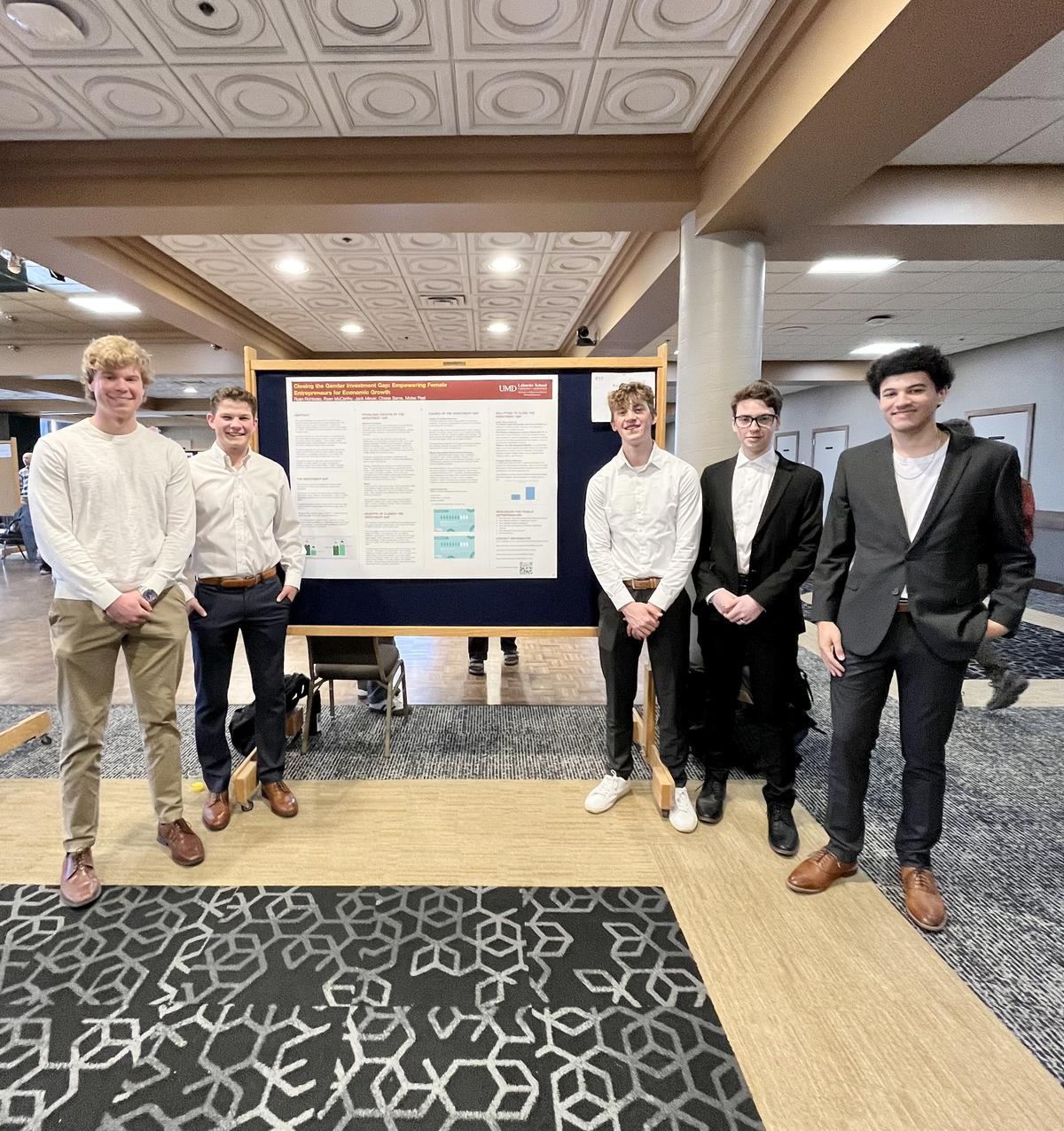Attendees spoke to the students about their research projects, key findings, and what they learned. Below are insights from some of the students.
Measuring the Impacts of Career Training on the Economy
Mahad Ahmed and Mitchell Bakken
What was the most interesting thing you learned throughout your project/research?
Ahmed: The most interesting thing I've learned throughout my research is the effects on taxpayers from someone moving from a part-time job to a full-time career. I found that if someone were to move from a part-time cashier to full time construction laborer the public would save over $600,000 over the course of their career.
Bakken: The financial benefits of moving into a stable career compared to a minimum wage part-time job were much greater than I ever expected. From our study’s findings, the net financial benefits (extra cash after necessary expenses) to the individual over 35 years ranged from $600,000 to almost $1 million. That is an insane increase.
How do you see this project/research helping you in the future?
Ahmed: From this project, I have a better understanding of the allocation of public assistance and the effects it has on taxpayers. This project also helped me present my findings to a general audience.
Bakken: The experience I got crunching numbers in excel will definitely help me in my future. I was also heavily involved in most aspects of this project—data analysis, graphics, and the report. That is all good experience for future projects.
Gen-Z & Information Overload Related to Social Media
Natalie Ostrand, Lily Jedneak, and Kate Mohr
What was the most interesting thing you learned throughout your project/research?
Ostrand: The most interesting thing I learned throughout my research is that younger consumers are less likely to get their news from websites or by watching TV. Rather, many young consumers are getting their news strictly from social media. Although news and information is widely accessible on social media, the information is far more likely to be false.
How do you see this project/research helping you in the future?
Ostrand: I see this project helping me in numerous ways in the future, both as a consumer and a marketer. As a consumer, it helped me understand that it is important to engage in critical thinking when evaluating news and to take breaks from consuming information. As a future marketer, the project has taught me the importance of keeping marketing messages short to keep consumers engaged.
Closing the Gender Investment Gap: Empowering Female Entrepreneurs for Economic Growth
Ryan Rohlader, Ryan McCarthy, Jack Meyer, Chase Sams, Myles Peel (pictured in photo)
What was the most interesting thing you learned throughout your project/research?
Rohlader: The most interesting thing I learned throughout this project was the extent to which the stigmas and biases affect female entrepreneurs trying to receive funding for their businesses. Specifically, I was intrigued by the fact that venture capitalists (regardless of their gender) were less likely to invest in women-owned businesses than in male-owned businesses.
Rohlader: How do you see this project/research helping you in the future?
I am very interested in entrepreneurship, and I am currently trying to grow a couple of businesses of my own. In the future I plan on investing in other businesses. The knowledge I gained from this project will help me to make clear investing decisions, especially when it comes to women-owned businesses.
Assessment of Wood Product Manufacturing in Minnesota
Avery Wendinger
What was the most interesting thing you learned throughout your project/research?
Wendinger: I was able to learn a lot about Minnesota's natural resources and forest product industries. Interestingly, Minnesota has a lot of underutilized tree species, such as balsam fir and maple, that could provide a low-cost resource if companies could find ways to utilize them.
How do you see this project/research helping you in the future?
Wendinger: I plan on going to grad school in the next few years for economics, so having previous research experience, especially outside of the classroom, is invaluable. This project also sparked a greater interest in natural resources and forest economics, which is something I might consider as a potential field of study.
